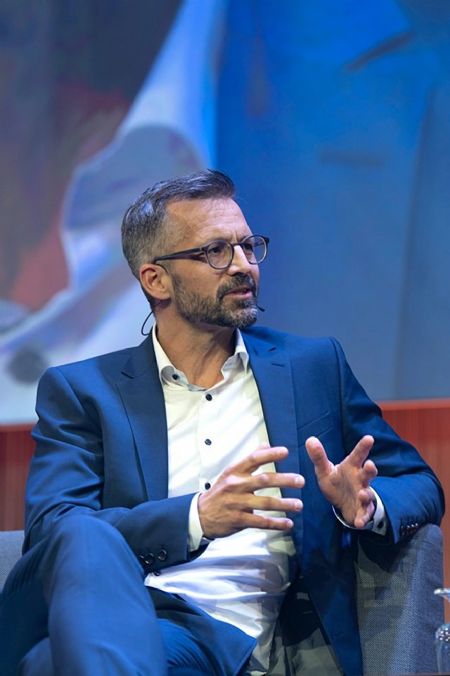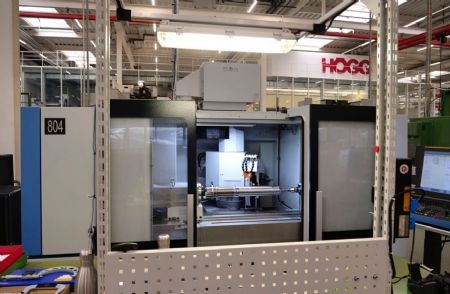 Left to right: production manager Stefan Kaufmann, CEO Ivo Högg and programmer/setter Andreas Hausmann
Left to right: production manager Stefan Kaufmann, CEO Ivo Högg and programmer/setter Andreas HausmannWhen the blacksmith Alfred Högg founded his forge in Lichtensteig, Switzerland, in 1905, he could not have imagined that his company would still be going strong four generations later. Today, almost 120 years since the company was established,
Högg AG Produktionstechnik resides in a ‘state of the art’ production facility in nearby Wattwil and has developed into a leading player in the metalworking industry known far beyond eastern Switzerland, with over 50 CNC machines from renowned manufacturers on 10,000m
2 of production space. In the realm of cylindrical grinding, Högg has relied on the Swiss grinding specialist
Kellenberger for years.
Högg AG Produktionstechnik is one of three mainstays of the family-run Högg Group. The company processes around 100 tonnes of steel, 100 tonnes of chrome steel and 200 tonnes of aluminum every year, and the trend is rising. The products — high-precision parts, customised profiles and assembled sub assemblies — are manufactured for a range of industrial sectors including general mechanical engineering, the energy sector, the textile machinery industry, aerospace, micromechanics, sensor and medical technology, and the laser industry.
From this high-performance base, two company spin-offs have evolved: Högg Liftsysteme AG in 1990, and the Simplify Engineering AG in 2012, a system provider for the transportation of people and goods. The three companies are managed independently, but operate in a network manner and take advantage of the synergies resulting from cooperation, as in the case of stair lifts, where components are designed at Simplify Engineering AG and manufactured by Högg Produktionstechnik. 160 employees work in the entire group, 110 of them in Högg Produktionstechnik alone.
Stability and continuityBrothers Ivo and Roman Högg are the fourth generation of the family and are responsible for the interests of the entire group, as well as the individual companies. Ivo Högg, the Group’s CEO, said: “We are constantly working on defining innovations that will ensure the success of the company. In an owner-managed family business, long-term strategies can be implemented very well. This creates stability and continuity for our customers and employees and ultimately also for our suppliers. Our employees play a crucial part. Many have been with us for a very long time and all of them are characterised by being very competent and customer-oriented.”
 Pictured right: CEO Ivo Högg at the Prix SVC award ceremony
Pictured right: CEO Ivo Högg at the Prix SVC award ceremonyTo ensure that this remains the case, Högg has been training its own junior staff for many years. Stefan Kaufmann has been in charge of all manufacturing matters at Högg Produktionstechnik since 2014. He and his 85 highly qualified production staff have an excellent command of all processes involved in machining, such as turning, drilling, milling and grinding. In addition to the usual materials like steel, aluminum and brass, they are also equipped to machine ceramic parts, for example, for the textile industry, which is strong in the region, and difficult materials such as INVAR, an iron-nickel alloy, which require special tools.
The range extends from smaller workpieces to 6m-long milled special profiles. Lot sizes typically range from 50 to 2,000, but single-part production and large series are also not uncommon. The production hall therefore houses a very large variety of lathes, milling machines and grinding machines.
The company has a total of seven grinders, including two Kellenberger universal cylindrical grinding machines, one of originally two KEL-Varias and, as the latest addition, a Kellenberger 100, which was added in 2021. The KEL-Varia universal cylindrical grinding machine, the predecessor model of today's premium Kellenberger 1000 series, is also renowned for the highest machining and surface quality. Its high static and dynamic rigidity and stability form the basis for high precision and great productivity. The performance spectrum of this machine is oriented towards the quality requirements of precision manufacturing of prototypes as well as small and medium series.
When it came to procuring the new cylindrical grinding machine, only Kellenberger was approached. Stefan Kaufmann explained: “We attach great importance to considering suppliers from the region whenever possible. The advantage of being close by is, of course, also that the service is on-site quickly when you need it. However, we already work with KEL-Remote quite often, which is the online service module from Kellenberger. We are very satisfied with that.”
The Kellenberger 100 is a modular platform solution with which different machine concepts can be realised with strong customer orientation. The machine is available with centre widths of 1,000/600mm and a centre height of 200mm and is designed for workpiece weights up to 150kg. Moreover, the high drive power of the grinding wheel ensures increased productivity, while the newly developed Z-guide ensures high profile accuracy. The C-axis with direct drive brings higher accuracy for non-circular grinding. This is very important for workpieces such as cam disks, which are manufactured at Högg.
Collision-free universal headThe technical highlights of the machine include an innovative compact grinding head (10 grinding head variants, 11.5kW drive power, 500mm wheel, up to 63m/s, HF spindles for internal grinding including diagonal and tandem arrangement), a collision-free universal head with three tool positions and one measuring position, and a new measuring probe arrangement without swivel mechanism for increased measuring accuracy. The reinforced casing allows the largest grinding wheel diameters for internal grinding (up to 125mm).
Polymechanic Andreas Hausmann has been with the company for over 40 years. He started as an apprentice in 1981 and now operates and programs the Kellenberger machines, among others. He said: “In terms of the Kellenberger 100, we are not only convinced by the machining quality with an accuracy of 2/100ths, the linear guides and the good heat transfer, but also by the better accessibility to the well-structured working area and the wider distance between the spindles. Furthermore, the grinding head, equipped with two internal grinding spindles, has a better layout.”
 Pictured left: Typical workpiece: cylinder during grinding on the Kellenberger 100. Material: steel hard chrome plated, batch sizes usually 1 to 100
Pictured left: Typical workpiece: cylinder during grinding on the Kellenberger 100. Material: steel hard chrome plated, batch sizes usually 1 to 100The Kellenberger 100 is equipped with the new Fanuc 31i CNC control with 19in touchscreen. Andreas Hausmann appreciates the simple programming that is possible directly on the machine with the new Blue Solution software developed by Kellenberger. He continued: “However, due to the part specification, programming at our company is usually done externally with the Kellenberger Black CAM Solution software, which was specially developed for non-circular grinding. The control also has the scrap minimisation function, which identifies influencing or interfering factors in a test run.”
The Kellenberger 100 is ideally suited for a wide variety of automation solutions. However, although about 30% of all machines at Högg are already automated, they do not see any need for the Kellenberger 100 to be automated. Stefan Kaufmann said: “This can change, but at the moment the workpieces do not allow for it.”
Good accessibilityHögg’s Kellenberger 100 is configured with a centre width of 1,000 and a centre height of 200 and is equipped with a standard tailstock. A synchronised tailstock would have been optionally available. The machine also convinces with the good accessibility to the generous working area.
The consistent separation of the production areas into steel machining and aluminum machining shows how much attention is paid to the highest quality at Högg. Mr Kaufmann said: “Aluminium parts are sensitive to scratching. But the surfaces of the machined workpieces, such as cylinder tubes or pistons, need to be flawless. That is why we pay extreme attention to cleanliness and prevent any flying chips. Aluminum chips in particular are critical, and they should stay in place.” Högg also has a clean room available for the assembly of components for sensitive industries such as the vacuum, semiconductor and solar industries.
Sustainability plays a decisive role in the company. From the photovoltaic system on the roof to the groundwater for heating or cooling of the production hall to the recycling of materials, everything at Högg is exemplary. 100% of the electrical energy is generated from renewable sources and the aim is to achieve completely climate-neutral production.
With this in mind, it is therefore not surprising that the company was nominated for the
Prix SVC Ostschweiz 2022, landed among the top six and was awarded a diploma. The prize is offered and awarded to exemplary Swiss companies every two years by the
SME network Swiss Venture Club. What counted most for the nomination was the company’s innovative spirit and its regional roots; and, of course, the company’s performance. In the case of the Högg Group, all three aspects are beyond doubt.